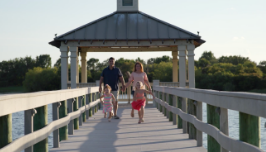Jeff is a real patient living with MF.
These are stories from real patients who are sharing their experience living with CTCL and being treated with POTELIGEO. These videos represent their experiences at the time the video was recorded. Given the nature of CTCL, experiences may change over time. Individual results may vary. These patients have been compensated by Kyowa Kirin for their participation in these videos.
Jeff remembers being excited as he boarded the plane to Connecticut. He had the love of his life Sherri by his side who would be meeting his family for the first time and things were looking up. Until, that is, he began to feel a sudden and intense itching and burning on his thighs.
He went to a local walk-in clinic and was prescribed steroids that gave him some relief, but only temporarily. Days later, the rash came back with a vengeance, spreading to his arms and neck.
Hear from real patients about their MF & SS treatment journey.
This was the first stop in what would become a 3-year journey he describes as “suffering from the unknown,” a journey defined by misdiagnosis and endless rounds of steroids, eczema creams, and other treatments. Each time the rash returned, ultimately forcing him to step away from the things he loved to do.
Jeff had dedicated his life to coaching and refereeing football and basketball for teens. He enjoyed watching them grow over the years and believed that sports had a unique way of teaching important life lessons. As much as he loved supporting and encouraging kids, he grew self-conscious as his rash worsened, leading him to make the difficult decision to stop and focus on advocating for himself.
After making little progress with his initial dermatologist, his now fiancée Sherri convinced him to get a second opinion. With a new doctor came another year filled with biopsies and inconclusive results, yet Jeff kept pushing for answers.
Empathizing with his pain, his doctor reached out to his friend, a highly regarded immunologist and allergist, and Jeff sent him pictures of his skin. That evening, the doctor called Jeff and told him to get to a local cancer hospital first thing in the morning. It was there that Jeff finally received the devastating news—he had Mycosis Fungoides (MF), the most common form of a rare blood cancer called cutaneous T-cell lymphoma (CTCL).
After he got through the initial shock of receiving a cancer diagnosis, Jeff focused on working with his doctor to better understand CTCL and the path forward. He learned that while MF may begin with skin-only symptoms, 1 in 3 cases will advance beyond the skin into the blood and other areas, so it was important that they monitor his skin and blood.
Despite trying several treatments, including radiation, ultraviolet light therapy, and even a short stint in a clinical trial, Jeff’s lesions progressed to cover over 70% of his body and tests showed the cancer had advanced to his blood. That’s when Jeff’s doctor brought up POTELIGEO and said, “I believe this will help you.”
After a discussion of the benefits and risks, Jeff began treatment with POTELIGEO in January 2020, receiving weekly infusions for the first 5 weeks of treatment before moving to an infusion every 2 weeks. By his second infusion, Jeff started to see results and, over time, his skin and itching began to clear. This is Jeff’s experience and individual response to treatment with POTELIGEO varies.
Soon Jeff was back to refereeing and coaching sports, this time without people staring at the heavy rashes that used to cover his arms. While he has always stressed the importance of teamwork in sports, he now has a more personal appreciation for its role in getting him through the ups and downs that a cancer diagnosis brings.
Today, Jeff’s cancer remains well-controlled, though occasionally he has small red itchy areas that he treats with a cream. He has an unending appreciation for Sherri and his children, Jeffrey and Megan, for their continued love and support, and is proud that even at his most desperate times, he found the inner strength to persevere and fight to find answers. Things are once again looking up.

“It’s easy to feel overwhelmed, to say it’s just not going to work and give up. I’m grateful to my clinical care team, family, and friends for helping me to see a path forward, that there’s hope.”
Want to share your POTELIGEO story?
If you or a loved one is interested in sharing your experience on treatment with POTELIGEO, please call 1-877-565-0132, Monday through Friday, 9 AM to 9 PM ET



